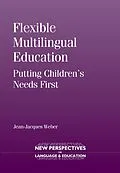This book examines the benefits of multilingual education that puts children's needs and interests above the individual languages involved. It advocates flexible multilingual education, which builds upon children's actual home resources and provides access to both the local and global languages that students need for their educational and professional success. It argues that, as more and more children grow up multilingually in our globalised world, there is a need for more nuanced multilingual solutions in language-in-education policies. The case studies reveal that flexible multilingual education - rather than mother tongue education - is the most promising way of moving towards the elusive goal of educational equity in today's world of globalisation, migration and superdiversity.
Autorentext
Jean-Jacques Weber is Professor of English and Education at the University of Luxembourg. His research interests include discourse analysis, and multilingualism and education, and he has recently co-authored Introducing Multilingualism (2012) and co-edited Multilingualism and Multimodality (2013).
Inhalt
Acknowledgements
1. Introduction
Part I
2. Using Non-standard Varieties in Education
3. The Issue of Access
4. What Makes and Breaks a Good Language-in-education Policy? A Social Perspective
Part II
5. The United States of America
6. Hong Kong and China
7. Singapore
8. South Africa
9. Luxembourg
10. Three Autonomous Communities of Spain: Catalonia, the Basque Country and Galicia
11. Conclusion
References
Index
